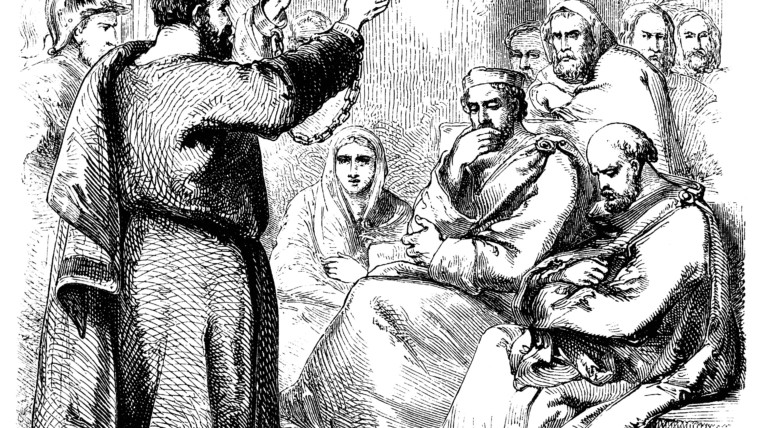The Romans Road Not Taken
by Christine Egbert
The last stanza of Robert Frost’s famous poem, The Road Less Traveled reads: “Two roads diverged in a wood and I took the one less traveled by … and that has made all the difference.”
Much like America’s most loved Poet Laureate, Robert Frost, those of us who have returned to the ancient paths (the Hebraic roots of our faith) which the LORD (Yahweh) declared in Jeremiah 6:16 we should walk in, can proclaim what a difference this less-traveled faith-path has made. In keeping with the metaphor, I’ve named this article “The Romans Road Not Taken”. For over the centuries many theologians have trodden a well-traveled path on which they’ve cherry-picked (out of context) passages Paul wrote, to establish a manmade Church doctrine. One such distortion teaches that since man is justified by faith, without the works of the law (Romans 3:28), Christians need not keep the law. Likewise, many have wrested Romans 6:14, which says, “You are not under law, but under grace,” to cast obedience as the enemy of grace.
On our road trip along the Romans Road, we’ll stop and examine only those verses which have been used to cast faith as the enemy of obedience, verses that extol the Torah, and verses that show that Gentile believers are grafted into Israel’s cultivated Olive Tree. But before we begin our tour down the Romans Road, it is imperative that we define two key terms, and define them biblically.
The first term is sin.
1 John 3:4 Everyone practicing sin also practices lawlessness—indeed, sin is lawlessness.
The second term is truth.
Psalms 119:142 Your justice is righteousness forever, and Your Torah is truth.
First Stop
Romans 1:4-5 He was appointed Son of God in power according to the Spirit of holiness, by the resurrection from the dead. He is Christ Jesus (Messiah Yeshua) our Lord. Through Him we have received grace and the office of emissary, to bring about obedience of faith among all the nations on behalf of His name.
What We Have Learned
Through Jesus Christ (Yeshua the Messiah) we receive grace to become His emissaries. Our mission: bring about the obedience of faith to all Nations. Biblical faith requires obedience. Why? Because as James wrote, “faith without works is dead.” This is why Luke declared in Acts that God gave His Holy Spirit to those who obey Him.
Acts 5:32 And we are witnesses of these events—as is the Holy Spirit, whom God has given to those who obey Him.
Next Stop
Romans 2:6-8 He (God) will pay back each person according to his deeds. To those who by perseverance in doing good are seeking glory, honor, and immortality—eternal life. But to those who are self-seeking and do not obey the truth, but obey unrighteousness—wrath and fury.
What We Have Learned
How we live matters to God. The doctrine of “once saved always saved” is simply unbiblical. Believers who know the truth are expected to obey the truth. We are to persevere in doing good, in seeking glory, in seeking honor, and in seeking eternal life. Those who do not obey truth, but who obey unrighteousness, will receive wrath.
Next Stop
Romans 2:12-13 “For all who have sinned outside of the law (Torah) will also perish outside of the law (Torah), and all who have sinned according to the law (Torah) will be judged by the law (Torah). For it is not the hearers of the law (Torah) who are righteous before God; rather, it is the doers of the law (Torah) who will be justified.
What We Have Learned
Be doers of the Torah. Paul does not teach against keeping Torah. He teaches against hypocrisy. Later in this chapter in verses 25-29 he writes that if we violate Torah, then physical circumcision, which is worthwhile when one keeps the Torah, becomes uncircumcision. If Gentiles from the nations keep the righteous decrees of the Torah, they will be counted as circumcised, for their heart has been circumcised. A Jew must be circumcised inwardly (first) for circumcision to have an advantage.
Next Stop
Romans 3:20-31 For no human, on the basis of the law (Torah) observance, will be set right in His sight—for through the law (Torah) comes awareness of sin. But now God’s righteousness apart from the law (Torah) has been revealed, to which the the Law (Torah) and the Prophets bear witness—namely, the righteousness of God through putting on Christ Jesus (Messiah Yeshua), to all who keep on trusting… God set forth Jesus (Yeshua) as an atonement, through faith in His blood, to show His righteousness in passing over sins already committed… Since God is One, He will set right the circumcised by faith and the uncircumcised through faith. Do we then nullify the law (Torah) through faithfulness? May it never be! On the contrary, we uphold the law (Torah).
What We Have Learned
The Torah reveals sin. Salvation comes with faith in Israel’s Messiah. Faith does not nullify the Torah. Faith establishes the Torah.
Next Stop
Romans 6:9-16 …Christ (Messiah), having been raised from the dead, no longer dies… He died to sin once for all, but the life He lives, He lives to God… continually count yourselves both dead to sin (violation of Torah) and alive to God in Christ Jesus (Messiah Yeshua)… do not keep yielding your body parts to sin as tools of wickedness… yield yourselves to God as those alive from the dead, your body parts as tools of righteousness… sin shall not be master over you, for you are not under law but under grace… Shall we sin (violate Torah) because we are not under law but under grace? May it never be!… you are slaves to what you obey—whether to sin resulting in death or to obedience resulting in righteousness.
What We Have Learned
We as believers are to count ourselves as dead to sin (violating Torah) and alive to God. We are no longer to yield our bodies as tools to unrighteousness, for when we yield to sin, sin becomes our master. we have been freed from bondage to sin (violating Torah) by God’s grace through faith in Jesus’ (Yeshua’s) death and resurrection.
Next Stop
Romans 7:7-25 What shall we say then? Is the law (Torah) sin? May it never be! On the contrary… I would not have known about coveting if the law (Torah) had not said, “You shall not covet.” But sin… worked in me through the commandment all kinds of coveting. For apart from the law (Torah), sin is dead… The commandment meant for life was found to cause death. Sin, taking an opportunity through the commandment, deceived me and through it killed me. So then, the law (Torah) is holy, and the commandment is holy and righteous and good. Did that which is good become death to me? May it never be! Rather it was sin working death in me—through that which is good—so that sin might be shown to be sin, and that through the commandment sin might become utterly sinful. For we know that the law (Torah) is spiritual; but I am of the flesh, sold to sin… For I delight in the law (Torah) of God with respect to the inner man, but I see a different law in my body parts, battling against the law of my mind and bringing me into bondage under the law of sin which is in my body parts. Miserable man that I am! Who will rescue me from this body of death? Thanks be to God—it is through Christ Jesus (Messiah Yeshua) our Lord! So then, with my mind I myself serve the law (Torah) of God; but with my flesh, I serve the law of sin.”
What We Have Learned
Paul assures us that the Torah is not sin. Without Torah we would not understand what sin is. The Torah is holy, the commandments holy and righteous and good. The Torah is spiritual. Paul struggles against sin (the evil inclination) in his flesh, but he delights in the Torah in his inner man.
To quote Dr. Ron Moseley, from his book Yeshua, a Guide To The Real Jesus & The Original Church, page 39, “Since the first century, the Church, for the most part, has misunderstood the Law, which both Jesus and Paul dearly loved, and by which they both lived…when the early Church gradually moved from Jerusalem to the West, many of the Roman converts who became church leaders retained certain of their pagan practices. As a result, these Roman leaders interpreted the Hebrew Scriptures in the light of their Greek background, imposing on the biblical text a non-Hebraic interpretive scheme. This had the effect of foisting incorrect information into the Church’s theology concerning God’s Law, information that was irreconcilable with the Word of God as taught by Jesus and Paul…Paul never attempted to start a new religion that opposed Torah. His arguments that appear to be directed against the Law were actually against misuse of the Law by those who were putting Gentile congregations in bondage, teaching that keeping the Law was required for salvation.” Let’s move on.
Next Stop
Romans 8:1-8 Therefore, there is now no condemnation for those who are in Christ Jesus (Messiah Yeshua). For the law of the Spirit of life in Christ Jesus (Messiah Yeshua) has set you free from the law of sin and death. For what was impossible for the law (Torah)—since it was weakened on account of the flesh—God has done. Sending His own Son in the likeness of sinful flesh and as a sin offering, He condemned sin in the flesh—so that the righteous requirement of the law (Torah) might be fulfilled in us, who do not walk according to the flesh but according to the Spirit. For those who live according to the flesh set their minds on the things of the flesh, but those who live according to the Spirit set their minds on the things of the Spirit. For the mindset of the flesh is death, but the mindset of the Spirit is life and peace. For the mindset of the flesh is hostile toward God, for it does not submit itself to the law of God—for it cannot. Those who are in the flesh cannot please God.”
What We Have Learned
These scriptures teach that it is faith in Jesus (Yeshua) and His atoning sacrifice that sets us free from bondage to sin (violation of Torah). Before Faith in Jesus (Yeshua), we were in bondage to sin which leads to death. Through faith in God’s Son, who became our sin offering, we who have received God’s Holy Spirit, and who walk in His Spirit, can finally fulfill the righteous requirements of God’s Law (His Torah/instructions). Those without the Spirt of God, or who do not submit their will to God’s Spirit, are hostile to the things of God and do not—cannot—submit to the law (Torah) of God.
Next Stop
Romans 9:1-33 I tell the truth in Christ (Messiah)… my sorrow is great… For I would pray that I myself were cursed, banished from Christ (Messiah), for the sake of my people—my own flesh and blood, who are Israelites. To them belong the adoption and the glory and the covenants and the giving of the law (Torah) and the Temple service and the promises. To them belong the patriarchs—and from them, according to the flesh, Christ (the Messiah), who is over all, God, blessed forever. Amen. But it is not as though the word of God has failed. For not all those who are descended from Israel are Israel, nor are they all children because they are Abraham’s seed; rather, “Your seed shall be called through Isaac.” That is, it is not the children of the flesh who are children of God; rather, the children of the promise are counted as seed… As it is written, “Jacob I loved, but Esau I hated.” What shall we say then? Is there injustice with God? May it never be!… What if God, willing to demonstrate His wrath and to make His power known, endured with much patience vessels of wrath designed for destruction? And what if He did so to make known the riches of His glory on vessels of mercy, which He prepared beforehand for glory? Even us He called—not only from the Jewish people, but also from the Gentiles—as He says also in Hosea, “I will call those who were not My people, ‘My people,’ and her who was not loved, ‘Beloved.’ And it shall be that in the place where it was said to them House of Israel, ‘You are not My people,’ there they shall be called sons of the living God.” Isaiah cries out concerning Israel, “Though the number of the sons of Israel be as the sand of the sea, only the remnant shall be saved… What shall we say then? That Gentiles, who did not pursue righteousness, attained righteousness—that is, a righteousness of faith. But Israel, who pursued a law (Torah) of righteousness, did not reach the law (Torah). Why? Because they pursued it not by faith, but as if it were from works…”
What We Have Learned
Not all of the physical seed of Israel are the Israel of God. Only Israelites who put their Faith in God’s promises are counted as Abraham’s Seed. And Gentiles, who never pursued righteousness, attained righteousness and salvation through faith in Israel’s Messiah. But Israelites, who placed their hope for righteousness through keeping the Torah, apart from faith in Israel’s Messiah, failed to achieve it.
Next Stop
Romans 10:1-4 “Brothers and sisters, my heart’s desire and my prayer to God for Israel is for their salvation. For I testify about them that they have zeal for God—but not based on knowledge. For being ignorant of God’s righteousness and seeking to establish their own, they did not submit themselves to the righteousness of God. For Christ (Messiah) is the goal of the law (Torah) as a means to righteousness for everyone who keeps trusting.”
What We Have Learned
Jesus Christ (Yeshua Messiah) is the goal of the Torah. He is our righteousness, but we must continue to trust Him.
Next Stop
Romans 11:1-31 “I say then, God has not rejected His people, has He? May it never be! For I too am an Israelite, of the seed of Abraham, of the tribe of Benjamin. God has not rejected His people whom He knew beforehand… What then? What Israel is seeking, it has not obtained; but the elect obtained it, and the rest were hardened… I say then, they did not stumble so as to fall, did they? May it never be! But by their false step salvation has come to the Gentiles, to provoke Israel to jealousy. Now if their transgression leads to riches for the world, and their loss riches for the Gentiles, then how much more their fullness!… For if their rejection leads to the reconciliation of the world, what will their acceptance be but life from the dead? If the firstfruit is holy, so is the whole batch of dough; and if the root is holy, so are the branches. But if some of the branches were broken off and you—being a wild olive—were grafted in among them and became a partaker of the root of the olive tree with its richness, do not boast against the branches. But if you do boast, it is not you who support the root but the root supports you. You will say then, “Branches were broken off so that I might be grafted in.” True enough. They were broken off because of unbelief, and you stand by faith. Do not be arrogant, but fear—for if God did not spare the natural branches, neither will He spare you. Notice then the kindness and severity of God: severity toward those who fell; but God’s kindness toward you, if you continue in His kindness; otherwise you too will be cut off! And they also, if they do not continue in their unbelief, will be grafted in; for God is able to graft them in again. For if you were cut out of that which by nature is a wild olive tree, and grafted contrary to nature into a cultivated olive tree, how much more will these natural branches be grafted into their own olive tree? For I do not want you, brothers and sisters, to be ignorant of this mystery—lest you be wise in your own eyes—that a partial hardening has come upon Israel until the fullness of the Gentiles has come in; and in this way all Israel will be saved, as it is written, “The Deliverer shall come out of Zion. He shall turn away ungodliness from Jacob. And this is My covenant with them, when I take away their sins.” Concerning the Good News, they are hostile for your sake; but concerning chosenness, they are loved on account of the fathers—for the gifts and the calling of God are irrevocable. For just as you once were disobedient to God but now have been shown mercy because of their disobedience, in like manner these also have now been disobedient with the result that, because of the mercy shown to you, they also may receive mercy.
What Have We Learned?
God never rejected Israel or the Jewish people, who were the only ones who returned after their exile. Paul was a Jew. Gentiles who come to faith in Israel’s Messiah are grafted into Israel’s Olive Tree, among Israel’s natural branches. And one day, when the fullness of the Gentiles is completed, the Deliverer will turn ungodliness from Jacob, for God’s call is without repentance, and when the Jews as a nation accept Jesus (Yeshua) as their Messiah, then Jesus (Yeshua) will return and the resurrection will occur, life from the dead.



